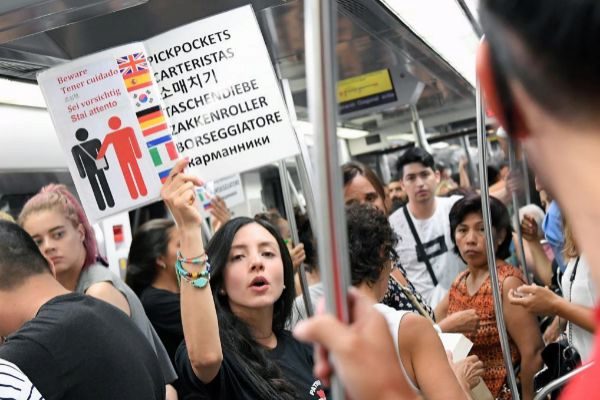Security crises often catch many by surprise; but only because they have looked the other way while the signs of deterioration accumulated to explode. The case of Barcelona illustrates this logic well. In fact, the quiet summer months have been altered by a chain of news about robberies and homicides in the city that have awakened public opinion to the escalation of crime suffered by the Catalan capital.
Usually, the first symptoms of the deterioration of security in a city are usually seen in an increase in theft and other crimes that do not necessarily involve deaths (robberies, brawls, etc.). Then, as the situation deteriorates, homicide begins to increase, driven by an increase in aggressiveness in criminal actions. Finally, if it is not intervened, criminal groups crystallize and become visible facts associated with the consolidation of organized crime such as extortion or account adjustments.
Barcelona started that drift long ago. According to sources from the Ministry of Interior, robberies with violence went from 9,650 in 2016 to 10,285 in 2017 and then to 12,277 in 2018, a steady increase of more than 27% in two years. The escalation has continued in the first quarter of 2019 with 3,549 crimes of this type, 28.6% more than in the same period of the previous year. At the same time, the crisis has entered a stage in which homicides have begun to accumulate . If the city suffered a total of 10 murders in 2018, it already adds 13 so far this year. The figures deny by themselves those who still insist on disqualifying the claims of citizens for insecurity as a pure problem of perception.
To understand how this has been achieved, it is necessary to look at the security situation of the Catalan capital as the result of the interaction between the social fabric of the city and the security apparatus - Mossos d'Esquadra, Urban Guard, etc.- Responsible for their protection. From this perspective, the crisis is explained by two issues. On the one hand, the city has changed and today it is more difficult to ensure . On the other hand, the system that must control crime has weakened substantially over the past few years. Starting with the first issue, Barcelona has become a very diverse and complex space. In the 15 years between 2003 and 2018, the number of legal immigrants registered in the province has increased from 268,093 to 802,741. In parallel, tourism has skyrocketed to more than eight million visitors in 2018. This does not mean that the increase in foreigners is the factor that explains the growth of crime; but certainly, in a more diverse environment, the police tend to have it harder.
In addition, Barcelona continues to show the effects of the economic crisis, especially in its periphery where municipalities such as Sabadell or Badalona maintain higher unemployment rates than they had before the great recession. In this context, social problems become a breeding ground for crime. The Catalan capital faces a growing consumption of narcotics. In fact, the number of heroin addicts has experienced a sharp increase and some studies point to it as the European city with the highest cocaine use. Meanwhile, areas of the urban center face the presence of groups of Unaccompanied Foreign Minors (MENA), frequently of North African origin, which have become one of the engines of crime growth.
For its part, the security system that protects the city gives increasing signs of ineffectiveness as a result of a combination of politicization, mismanagement and lack of resources . The independentist adventure piloted from the Generalitat has had two dire consequences for security. On the one hand, it has broken the neutrality of the Mossos, where a deaf battle has been unleashed between officials favorable and contrary to the process . On the other hand, it has made cooperation between the central government, the autonomous leadership and the local authorities almost impossible.
While the City Council has based its approach to the problem on a combination of slogans and denial of reality. Mayor Ada Colau has gained notoriety for her sympathies towards the squatter movement and denounced the problem of manteros as a result of an immigration law that does not allow illegal immigrants to work. This goes beyond the anecdotal because the implicit message is that some groups are entitled to violate certain laws - property rights or commercial regulations - if they think they are unfair. Such an approach in the mouth of the highest local authority can only have devastating effects on respect for legality.
At the same time, the economic adjustment as a result of the crisis has taken its toll on the capabilities to keep the law in order. In recent times, the debate has focused on the salary conditions of the agents - a more than fair claim - but little has been said about the means at their disposal - from the state of the vehicles to the individual team of the agents -, which are often scarce or in poor condition. In addition, the design of the security system has become obsolete in the face of new challenges such as the MENA.
So, recovering the security of Barcelona could be more difficult than optimists calculate. Certainly, there have been cities that have emerged from situations even more difficult than that of the Catalan capital. That was the case in New York in the early 1990s when it deployed a new security strategy that radically reduced crime and recovered the city for its inhabitants. But then it was a virtuous combination of new police techniques and political will that made rescue possible. In Barcelona, the security system is increasingly broken and there is no improvement in the political climate.
Román D. Ortiz is a security analyst.
According to the criteria of The Trust Project
Know more- Columnists
- Barcelona
- Mossos d'Esquadra
EditorialIndecent use of 17-A by independentistas
EditorialThe Barcelona of Colau, increasingly insecure
EditorialInterior must keep state secrets

